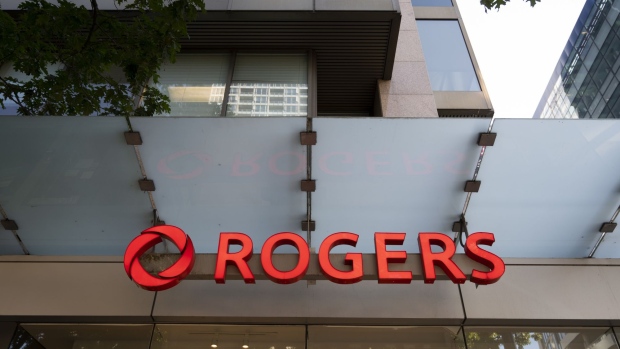Nov 7, 2022
Rogers Latest: Bureau Sees Antitrust Case as ‘Watershed Moment’
, Bloomberg News

(Bloomberg) -- A lawyer for Shaw Communications Inc. said Canada’s antitrust czar is guilty of “dramatic overreach” for trying to stop the company’s sale to rival Rogers Communications Inc.
Competition Commissioner Matthew Boswell’s attempt to block the C$20 billion ($14.8 billion) transaction is “neither fair or appropriate” because it ignores the major changes the companies made to the original deal terms to solve antitrust concerns, Kent Thomson, a lawyer representing Shaw, said in a court hearing.
The Rogers-Shaw deal, announced in March 2021, is one of Canada’s biggest-ever corporate mergers and is now before the country’s Competition Tribunal. The hearings began Monday morning.
Shaw shares rose 0.6% to C$35.79 in Toronto trading, while Rogers was up 1.5%. The takeover offer is for C$40.50 per Shaw share.
There’s also a second deal at play. Rogers and Shaw agreed to sell Freedom Mobile -- the division that includes most of Shaw’s wireless assets -- to Montreal-based Quebecor Inc. Boswell doesn’t believe that solves his worries about a takeover that would remove Shaw as a competitor in three of Canada’s four largest provinces.
Quebecor rose 1.3%, while BCE Inc. and Telus Corp. both fell.
READ MORE: Rogers Finally Gets Its Day in Court to Rescue Shaw Takeover
Rogers Makes ‘Pro-Competitive’ Case (4 p.m. NY)
Jonathan Lisus, a lawyer for Rogers Communications, outlined the core of the company’s case: that consumers will be better off, not worse, if its acquisition of Shaw goes ahead.
On the sale of Shaw’s Freedom Mobile division to Quebecor Inc., Lisus promised to bring evidence to “show you that it will be a much stronger competitor than it was under Shaw.”
The Competition Bureau’s argument that Freedom Mobile won’t be able to offer good deals to consumers in Western Canada is “untethered from reality,” he said. Quebecor’s Videotron unit is a strong player in the Quebec market and has been at least as disruptive to the major wireless firms as Freedom has been, Lisus added.
“This transaction is, in all respects, manifestly pro-competitive,” he said.
Shaw Accuses Telus in Antitrust Case (1:26 p.m. NY)
Shaw’s major rival in Western Canada, Telus Corp., “has joined hands with the Commissioner to block the transaction,” Shaw lawyer Kent Thomson said in his opening statement.
Shaw has had to balance spending between its wireless and wireline businesses because of limited capital, Thomson said. In the process, it’s become less competitive against much-larger Telus in the fight for cable and internet customers.
Telus is trying to keep that advantage by encouraging the competition commissioner to pursue his antitrust suit, the lawyer said.
“Rogers has size, scale, resources that are substantially greater than those of Shaw, but roughly equal to those of Telus,” Thomson said. “If the transactions are allowed to move forward, Rogers will be able to utilize its substantially greater resources to upgrade and expand the wireline network of Shaw.”
‘Watershed Moment’ for Competition (11:06 a.m. NY)
Boswell’s Competition Bureau presented first.
“The case comes at a watershed moment for wireless competition in Canada and presents the following question: Will Canada continue to see the growth of strong regional facilities-based competitors like Shaw?” said John Tyhurst, a lawyer for the bureau. “Or will it see weakened and dependent wireless competition, in the form of the proposed divestiture of Freedom to Videotron?”
This is the crux of the bureau’s argument. Quebecor, which operates under the brand name Videotron, is primarily a Quebec-based cable and wireless company. It doesn’t have Shaw’s long history, brand and extensive cable television and internet operations in Western Canada.
So Videotron may be able to operate Freedom Mobile but it wouldn’t be truly competitive with the industry’s dominant players -- Rogers, BCE and Telus Corp. -- and that will be bad for consumers, according to the bureau’s line of argument.
©2022 Bloomberg L.P.





